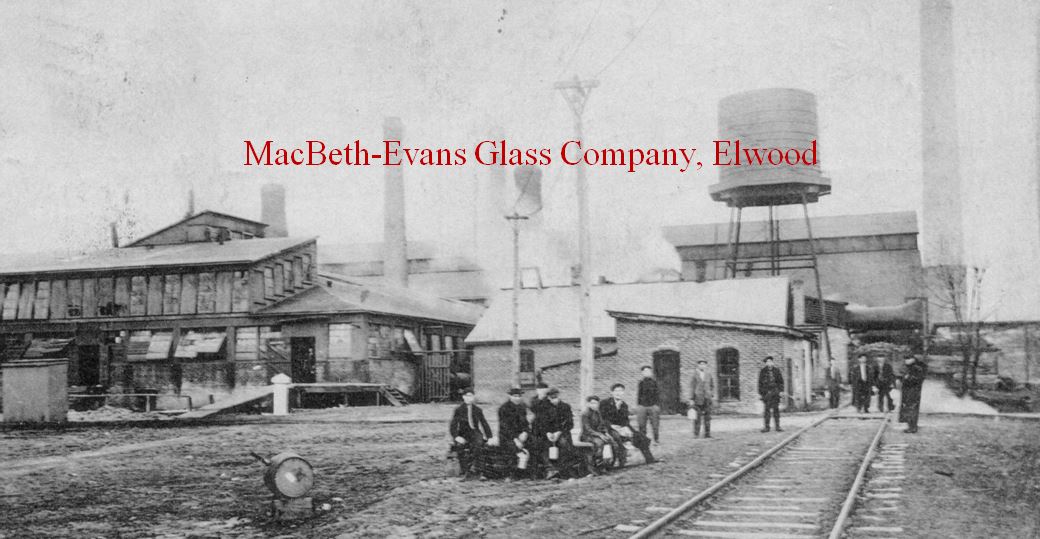|
A seemingly inexhaustible supply of natural gas was discovered in Elwood in the late 1880s. That, plus an abundance of sand suitable for glass-making, attracted the MacBeth-Evans Glass Company, who built the first glass factory in Elwood in 1890. Many more manufacturers followed, and during the gas boom days of the 1890s through the late 1930s, Elwood was known nationally for its glass, produced in various forms‒from lamp chimneys to large plate-glass windows. Glass-blowing was a skilled trade, not to be done by men new to the field, so a special train arrived from Pittsburgh in 1890, bringing 365 glass workers to Elwood. However, the glassblowers were highly paid, earning as much as $35 to $40 a day, and they were big spenders, bringing prosperity to the city. “No machine can ever take our place” was their boast as they flooded the city with their free-flowing money. At first, the MacBeth-Evans made only lamp chimneys and lantern globes, and for some time was the only plant in the world which manufactured oil-tempered lamp chimneys. The exceptionally sturdy chimneys were shipped to all parts of the world. In 1891, the company made the first optical glass successfully produced in the United States. With the depletion of the gas supplies, however, the work decreased at MacBeth-Evans, and in 1935 Corning Glass Works purchased the plant. As the industry continued its decline, the plant was finally closed down, and it was dismantled in 1938. Another important glass works located in Elwood was constructed by the Seiberling Glass Company interests of Akron, Ohio. Construction on the building was completed in 1891. The works, known as the Diamond Plate Glass Company, was at one time the largest glass factory of its kind in the world. It was later purchased by the Pittsburgh Plate Glass Company, but it closed in late 1903, as the gas boom collapsed. Through the years, other glass factories came and went in Elwood. They included the McCloy Glass Works, makers of lamp chimneys and lantern globes; the Elwood Window Glass Company, and the Vivsen & Weiskolp Bottle Works, manufacturers of caps and bottling machinery. Today, two glass factories remain in Elwood to carry on the tradition: St. Clair Glass Works/House of Glass, and Carol’s Legacy Glass. ● St. Clair Glass Works/House of Glass: In 1903, John “Pop” St. Clair, a French immigrant residing in Missouri, heard about the MacBeth-Evans plant and moved his family to Elwood to work for the company. But when MacBeth-Evans closed in 1938, Pop and son, Joe, set the wheels in motion to start their own company. St. Clair Glass Works opened in 1941, and their flawless crystal earned the praise of artistic glass connoisseurs. After Joe St. Clair died in 1987, his nephew, Joe Rice, stepped up to carry on the family tradition. Today, Rice is semi-retired and maintains his operation, House of Glass, at 7900 E. State Road 28 on a reduced schedule. Please call Rice at (765) 552-6841 for hours. ● Carol’s Legacy Glass: Local tinsmith Jeff Ball saw an opportunity when the St. Clair Glass equipment was being sold at auction in 1987. Ready for a new career direction, Ball purchased some of the equipment and opened his Prestige Art Glass factory and showroom in 1990. Today, Ball has carved an impressive niche in the specialty glass market. He has produced glass items containing dust from the original bricks of the Indianapolis Motor Speedway and has also made glass trophies presented at the Little 500 in Anderson. In honor of his wife, in 2018, Ball changed his business’s name to Carol’s Legacy Glass. The factory is located at 527 South 28th Street, and its showroom is open 8:00 a.m. to 4:00 p.m., Monday through Friday year round.
2 Comments
Darin L. Jolliffe-Haas
1/25/2023 10:39:42 am
Hello,
Reply
1/26/2023 08:11:33 am
Good morning, DLJH ...
Reply
Leave a Reply. |

